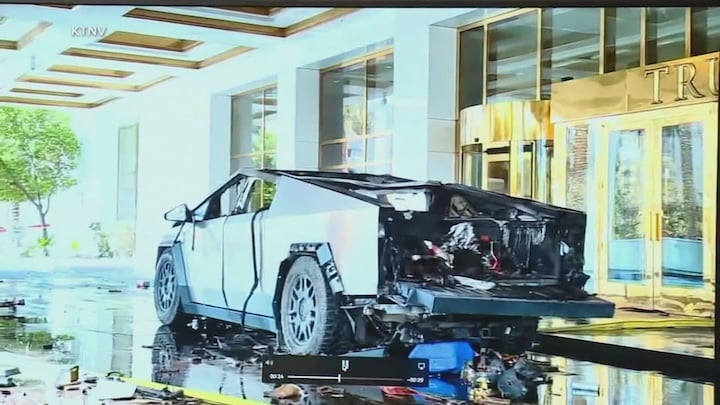New Year's Day broke when Shamsud-Din Jabbar, 42, an Army veteran and convert to Islam, drove his pickup truck onto crowded Bourbon Street in New Orleans, Louisiana. At 3:15 a.m. he exited the truck; engaged in a shootout with police; which killed 14 people, injuring thirty-five others. Not all but most of the victims were in their 20’s.
Matthew Livelsberger, a 37-year-old Green Beret, and highly decorated Army soldier, then drove a Tesla Cybertruck packed with firework mortars and gas canisters to the entrance of the Trump International Hotel Las Vegas. At 8:39 a.m. he shot himself in the head, after which the car exploded, injuring seven bystanders. He left a note saying the stunt was to serve as a “wakeup call for the country’s ills.”
Jabbar, however, detailed how his mass killing was designed to create news headlines which focus on the “war between the believers and the disbelievers.” In the social jungle of human existence, one cannot survive without a sense of social identity; all social memberships come with a cost; and the price of private memberships, creeds, or profiles comes at the cost of an egalitarian world.
Veterans and military personnel were implicated in the January 6 United States Capitol Attack, drawing the nation's attention to the spread of extremist views within the military. Far-right extremist groups had targeted veterans, law enforcement, and military personnel for recruitment. The Department of Defense (DoD) responded by initiating training, awareness, and whistleblower programs.
The broader context is the American society at large. Is the political and social divide widening? Probably not. Not if we’re paying the slightest bit of attention to history. Extremist groups have historically recruited from active and former military because of their specialized training, combat experience, access to weaponry, and leadership skills. They’re trained to carry out violent actions, and are often disillusioned when transitioning from the military to civilian life. The FBI claims Matthew Livelsberger suffered from Post-traumatic stress disorder (PTSD). A letter on his phone app explains:
We are the United States of America, the best country ... to ever exist, but right now, we are terminally ill and headed towards collapse … This was not a terrorist attack. It was a wake up call. Americans only pay attention to spectacles and violence. What better way to get my point across than a stunt with fireworks and explosives ... I need to cleanse my mind of the brothers I’ve lost, and relieve myself of the burden of the lives I took.
The "Us vs. Them" mentality is characterized by a strong sense of belonging to a group that opposes another. Race, color, religion, sex, and national origin among others all have skin in the game.
At birth, we’re all jotted down on paper as belonging to a group. The U.S. Census Bureau allows a wide array of choices including, Male or Female; American Indian, Pacific Islander, Asian, Black or White. We even get to belong to a city, state and nation.
Onward, we file off into religions, academic institutions and professions that strengthen the divide. Henri Tajfel, a social psychologist who developed the "Social Identity Theory" explained not how people categorize themselves into groups but why. Instinctually, according to Tajfel, we move to the center of the herd for safety. The Herd Mentality and groupthink are characterized by conformity over critical reasoning.
While there is no doubt Jabber wished to draw attention “to the believers and the disbelievers,” technology itself may be changing human discourse. In fact, evolution may evolve to a state of cooperation between in-groups; transcend social and religious boundaries; perhaps even lead to the emergence of a new and improved Global Family.
Neurologically tweaking the brain could lead to the evolution of society. Heres what we know at present. The medial prefrontal cortex (associated with self-representation and in-group bias) and the amygdala (related to emotional responses to out-group members) are responsible for social cognition, empathy, and intergroup processing. Fine tuning both could lead to a greater capacity for empathizing with members of out-groups, driven by evolutionary pressures to cooperate in diverse societies.
Technology may lead evolution, where mind and heart fail.
As online communities become increasingly influential, human identity may evolve to include virtual group affiliations, such as those based on shared interests, ideologies, or digital platforms. In 2024, there were 5.22 billion social media users, 63.8 percent of the world's population. Elon Musk intends to kick the tires.
For digital identity may be the new calling card to an interconnected global community. Global Citizenship will revolve around a common interest, e.g., climate change, pandemics, migration, the planet. Holy wars, for example, could become passé to a shared habitat we're all trying to save.
The Social Identity Theory explains that in-group favoritism and out-group discrimination are the evolutionary adaptations of group survival. However, as intergroup relations evolve we might see a reduction in tribalism. Evolutionary shifts in human social behavior might lead to a reduction in extremism and a move toward inclusive, cross-group cooperation. Particularly as humans face global existential threats. Strong AI (anticipated in the 2050's) will greatly exceed human cognitive capabilities; ultimately create mass unemployment; and become the de facto autonomous decision maker of the planet.
Perhaps Eugenics — a social and scientific movement that aims to improve the genetic quality of the human population — will achieve desirable traits and reduce the incidence of undesirables, e.g., genetic diseases or perceived intellectual or moral deficiencies. Sadly, we’ve seen all this before. Selective breeding, mass sterilization, immigration restrictions, exploratory medical procedures, even extermination camps failed to achieve a perfect race. Perhaps why we're now looking to the heavens.
Starlink has 4000 satellites orbiting space at present, and Elon Musk plans to deploy 12,000 in total, and potentially 42,000 in future. The goal is to provide high-speed, low-latency internet and to connect the underserved and remote areas of the world.
Thereby, connecting Musk’s Neuralink Project that aims to develop brain-computer interfaces that can revolutionize medicine, neurological disorders, and human nature, too. Social Identity be damned, social systems may soon require little more than a 10-minute, outpatient procedure in which a mad scientist at the other end of your phone can mezzo or moderate your eyesight, hearing, and human behavior.
Racial, ethnic and religious bias be gone, radicalizing our state of consciousness is at present on the horizon. But wouldn’t it be something if we could just seem to get there on our own.








